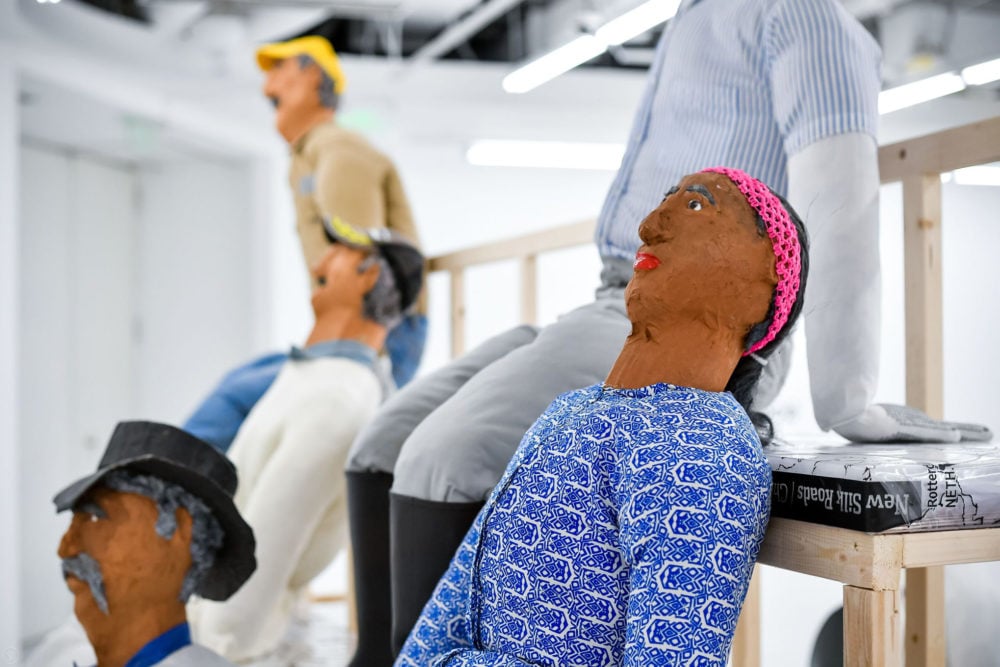
The director of Tate Britain, Alex Farquharson, and members of the 2019 Turner Prize jury announced the four nominees for the prestigious award this morning. They are Lawrence Abu Hamdan, Helen Cammock, Tai Shani, and Oscar Murillo, forming a scrupulously gender balanced shortlist.
After last year’s shortlist, which was dominated by artists working mainly in film and video, this year’s edition of the Turner Prize exhibition includes one artist who works in paint, sometimes: the art-market darling Murillo. While the 2019 nominees work in diverse media, they share a commonality in their use of performance, and their engagement with contemporary issues.
The politics of art funding threatened to overshadow the announcement, however. The Tate Britain’s director awkwardly fielded journalists’ questions about the prize’s sponsorship by the bus and train company Stagecoach. The company’s founder, Brian Souter, led an unsuccessful campaign in 2000 to keep laws in place in Scotland against teaching about homosexuality. Gay rights activists accused the millionaire businessman of bigotry, which he denied, and called for a boycott of his buses.
Established in 1984, the annual prize is closely watched because it represents a slice of the trends in contemporary art in Britain. The prize aims to stimulate public debate about the state of British contemporary art. Last year, there was much conversation (and a certain amount of grumbling) about all the nominees presenting video art.
Each year artists based in Britain are nominated for a recent exhibition that impressed the judges. The artists will take part in the Turner Prize exhibition which will run September 28 through January 12, 2020. The winner is due to be announced in a televised ceremony on December 3.
Every other year, the prize leaves Tate Britain and takes place in a gallery outside London. The 2019 edition will be presented at Turner Contemporary in Margate, the coastal town that inspired JMW Turner’s skies, and where perhaps one of the prize’s most controversial former nominees, Tracey Emin, was brought up. (Emin sparked intense public debate about contemporary art when she was shortlisted for My Bed in 1999).
The award comes with a £25,000 prize ($33,000), and the three runners up each receive £5,000 ($6,500).
Lawrence Abu Hamdan
Portrait of Lawrence Abu Hamdan at Kunsthaus Bregenz 2018. Courtesy the artist and Maureen Paley, London. Photo by Miro Kuzmanovic.
Lawrence Abu Hamdan has been nominated for his solo exhibition “Earwitness Theatre” at London’s Chisenhale gallery, and for the video installation Walled Unwalled and performance After SFX at Tate Modern, London.
Abu Hamdan’s work explores the politics of listening, and Walled Unwalled, which investigates the role of ear-witness testimony in reconstructing unseen events, is one of the works that will be featured in the main exhibition at the Venice Biennale, which opens next week. He is formerly a member of the group Forensic Architecture, which was nominated for the prize last year, although he was not involved with the specific work that was nominated.
Helen Cammock
Portrait of Helen Cammock © Magda Stawarska-Beavan. Courtesy the artist.
Helen Cammock has been nominated for her solo exhibition “The Long Note” at Void gallery in Derry~Londonderry, and IMMA in Dublin. Cammock works across film, photography, print, text, song and performance. Cammock, who was the winner of the Max Mara Art Prize for Women last year, makes work that engages complex social histories and the politics of voice. She will have an exhibition opening at London’s Whitechapel Gallery this summer, from June 25.
“The Long Note” is a film work that explores the history and the role of women in the civil rights movement in Derry~Londonderry at the beginning of the Troubles in 1968. The work emphasizes how Northern Ireland politics have often dominated the region’s social history, particularly the political positions taken by women.
Oscar Murillo
Portrait of Oscar Murillo, 2016. Photograph by Jungwon Kim © Oscar Murillo. Courtesy the artist and David Zwirner.
Art market darling Oscar Murillo has been nominated for his solo exhibition “Violent Amnesia” at Kettle’s Yard, Cambridge, and his solo exhibition at the chi K11 art museum Shanghai, as well as his participation in the 10th Berlin Biennale.
Murillo works in a mixture of media including sound, drawing, sculpture, video, and painting. His work explores issues of migration, community, exchange, and trade in today’s globalized world.
Tai Shani
Portrait of Tai Shani. © Tai Shani, courtesy the artist.
Tai Shani has been nominated for her participation in Glasgow International 2018, her solo exhibition “DC: Semiramis” at The Tetley, Leeds, and her participation in “Still I Rise: Feminisms, Gender, Resistance” at Nottingham Contemporary and the De Le Warr Pavilion, Bexhill-on-Sea.
Shani is known for her theatrical installations, performances and films, and the jury highlighted her ongoing project “Dark Continent” for its poignant relation of historical texts with contemporary issues. The project is inspired by a 15th century protofeminist text, Christine de Pizan’s The Book of the City of Ladies.
This year, the prize jury comprises: Alessio Antoniolli, the director of arts organizations Gasworks and Triangle Network; Elvira Dyangani Ose, senior curator at Creative Time and lecturer in visual cultures at Goldsmiths; Victoria Pomery, director of Turner Contemporary; and the writer Charlie Porter.
Last year, the Scottish artist Charlotte Prodger took the prize for her acclaimed solo exhibition “BRIDGIT / Stoneymollen Trail” at Bergen Kunsthall. Prodger will be debuting a newly commissioned film work at the Scotland + Venice exhibition in a canal-side venue, Arsenale Docks, during the Venice Biennale next week.